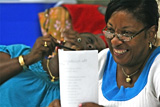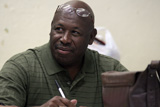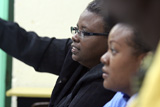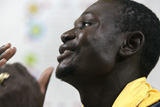 |
 |
 |
 |
 |
 |
 |
 |
We’ve just finished what is one of the most important class in our entire curriculum: Bible Doctrines Survey. This class is so weighty that we actually have to cut it into two halves, part 1 and part 2.
For the first half of the survey we cover the basic doctrines of theology: Bibliology, Theology Proper, Christology, Pneumatology, and Trinitarianism. Each subject builds upon the previous and the doctrine of God is essential in the understand of the believer.
I was shocked to see just how very little the students have interacted with these subjects.Churches for the most part have taken for granted the language of Christian doctrine, without a working understanding for what the terms mean.
Not only that, but I was equally shocked to see such false doctrines and theologies as Modalism, Biogenesis, the spiritual death of Jesus, and others present in their Christian background and culture. It was extremely evident that the subject of orthodox theology is necessary for our study and attention.
I also saw what I consider to be one of the highest achievements in our student’s theology. They said that routinely, when they encounter questions in the church, the natural response has become asking, “What does the text say,” as they all turn to the Word for truth.
This was one of the fundamental tenants that we covered in our two week study. Beyond logic, reason, and experience, the Word of God must be the believer’s authority for all truth. This is essential for orthodox Christianity, and this concept alone will daily transform their thinking about Christian doctrine.
I felt like this was one of the most difficult classes I’ve ever taught, yet at the same time it was quite rewarding. There is something awe-inspiring about studying God and seeking to answer the question “Who is God,” or as Jesus asked the disciples, “Who do you say that I am?” At the end of the day, it is our doctrine which will reveal whether or not we know the one and only true and eternal God and His Son Jesus Christ.
